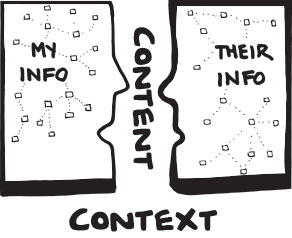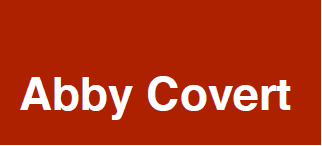Everything is Information Over Time.
The following speech was delivered on Feb 21, 2015 at World IA Day New York City.
—
I have been thinking about Everything a lot recently.
…and by Everything. I do mean capital “E” Everything
To serve the theme of this year’s event, I have been challenged to answer an important question: Does the way that we architect information affect happiness?
I think this question is asking a lot of things simultaneously. It is asking about our happiness as designers, our customers’ happiness, our coworkers’ happiness and even the big “we” of how our work affects our world’s happiness.
I think this question is challenging to answer due to the broad ness required to consider this question. It takes honesty to answer big questions like that of work like this.
It may start the gears of impostor syndrome quickly: I mean who am I to say that what I do makes people happy?
It might get you boiled up about the whole work/life balance thing: Is my job even supposed to make me happy? Or is paying my bills with something I don’t hate doing enough? Should I be finding happiness outside work?
There are many paths away from answering this question. It is a wicked question but an important one.
And after giving it a lot of thought, I have come to a fairly simple conclusion: All of these questions are based in fear.
- Fear of the affect we could have on other people’s well being.
- Fear that something we make or approved or funded or marketed might NOT affect everyone positively.
- Fear that a simple decision that we make on a whiteboard in New York City or an email from an airport lounge could make someone else feel less happy, less safe or less supported.
But this is the responsibility we all walk around with, especially if we work on things that are used by other people.
With our humanity, we have been gifted with a connection to one another, but we are also burdened by that ability to affect one another and the ease with which digital things are released has started to call into question this responsibility we have to each other.
This holiday season, the team at Facebook felt that realization of responsibility when their year in review video marketing tactics affected other people’s versions of Everything painfully.
As simple as it is now to diagnose in hindsight, I think the following fact is still true:
All that pain and anguish could have been avoided if one Facebook employee would have confronted the fear that had to be in at least one of their minds.
What if someone didn’t have an awesome year? What if their year really sucked? How would this make them feel?
And I have to believe that someone thought it, however subconsciously and didn’t/couldn’t say it. Someone had to. You know why? Because we are all humans and we all have someone in our life who is currently going through a down turn, just like we all have someone in our life experiencing an upturn. This is the ebb and flow of life.
It wasn’t a technological investment that was missing here. It wasn’t a social marketing faux pas or a lesson learned for the data model to improve next time. What was missing here was an investment into understanding the impact of one’s work, not just the usability or viability of it. And for that, the team at Facebook suffered publicly.
This will perhaps be forever known as a great case study of what can happen when a team asks “could we” when “should we” would have served the world better.
And I think that the prevalence of stories like these indicate a resurgence of interest in the idea of understanding. People want tools to deal with this crazy mess we call Everything. They want models to wrap their head and hands around so that progress can be made through the uncertainty that is before us.
I believe that when it really comes down to it our reality is a combination of the information we pull in towards ourselves and that which is pushed to us by other people over time.
And there are perhaps no two scarier concepts than information and time. Information can make us unhappy, perhaps more easily than it can make us happy.
Because:
- Information is sketchy. It belongs to each of us individually, but we are constantly seeking to affect other peoples’ with whatever we create
- Information can make sense to us, while simultaneously not making sense to those we wish to impart it to.
- Information has a time and place where it is helpful, and times and places where it is not.
- Information comes from a source, but the quality of that source can get in the way of its truth.
- Information can lead to action, or inaction, as the context may require.
- Information changes what we know, and therefore changes who we are.
Put like that, information becomes perhaps the single thing defining me from you.

Information is our unique version of Everything. And our unique version of Everything changes the content we make. That content is then experienced within a context and is interpreted by our audience.
This experience affects their unique version of Everything. Even if only slightly.
Maybe it is just me, but “affecting other people’s version of Everything” seems really freaking important. And it is absolutely what we all do:
“We affect other people’s version of Everything” – so yes, it is really freaking important.
I believe that the quality and structure of the information that makes up your version of Everything ultimately affects your ability to be happy.
Making information architecture a major contributor to something pretty lofty: Humanity’s Happiness.
Today I want to share some of my own IA work. I have organized examples around 5 ways I believe anyone can practice IA in pursuit of happiness.
1. Visualize my version of of reality
- Make a map just for yourself
- Show them what they know
- Play with structures in low fidelity
- Take the time and space needed to collect and iterate
- Give them something to point to
- Get out the big paper if you need to
2. Ask me good questions
- Enable “how much” and “yet” conversations
- Visualize gaps in agreement
- Start with simple node generating questions
- Level up the question complexity as you go
- Check in with yourself
- Ask the same question over time
3. Alleviate my anxiety and uncertainty
- Make buckets
- Visualize relationships
- Enable them to play with options
4. Help me to adjust
- Fight semantic dragons
- Assist in planning for phases, sprints, projects, releases et al.
- Visualize changes & Intent
- Leave room for real time data
5. Give the Gift of Clarity
- Visualize opportunity
- Teach something
- Visualize something hard to explain
- Inspire realistic, not simplistic thinking
- Pay attention to context of use
- Remember that important details may be in the process, not the result
In closing, I do believe that if we practice IA thoughtfully we can make people happier. I also believe that information architecture is not just for information architects. In fact if you make things, you probably already practice IA.
I wish I could make this easier, but it is not so. There is a long winding road between not knowing and knowing. And it is a bumpier ride if we start to consider the impact our work will have on humanity. But I believe it is a journey we must all start making if we are going to collectively walk towards happiness.
I also feel the need to warn you that there are many places to stop along the way and realize how far we have left to travel. In these moments, we can turn back from the fear of knowing or we can look forward with the bravery of not knowing.
This choice is uniquely ours, just like Everything.
Thanks for reading.
–
If you are interested in ways to get started practicing information architecture, I recently published a beginner’s guide called “How to Make Sense of Any Mess“
